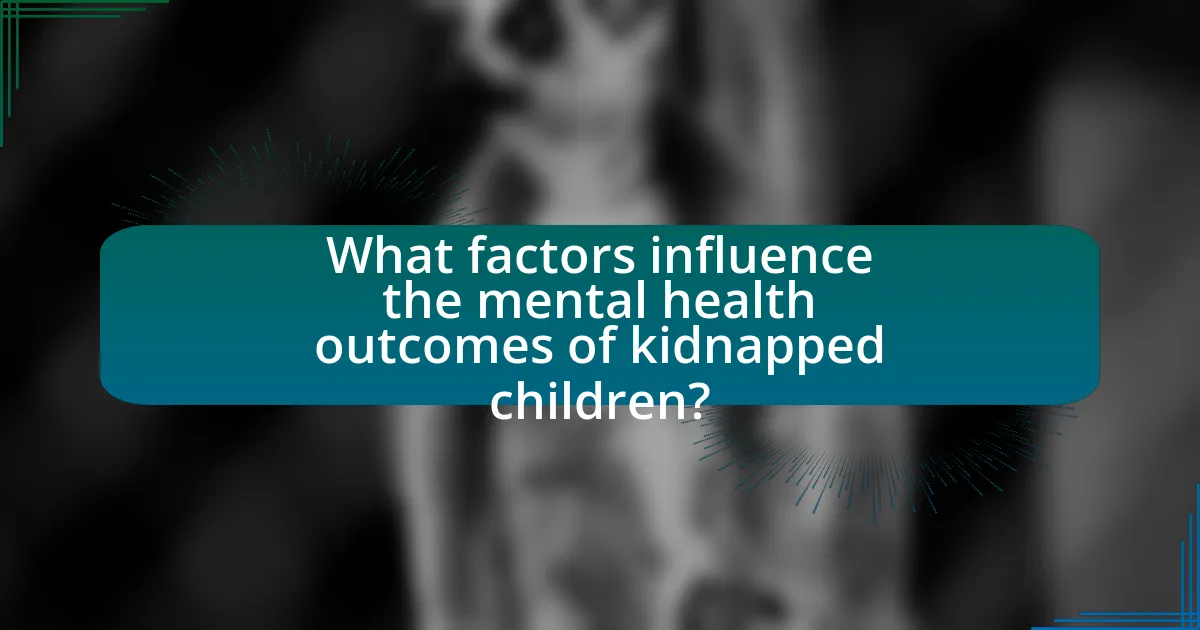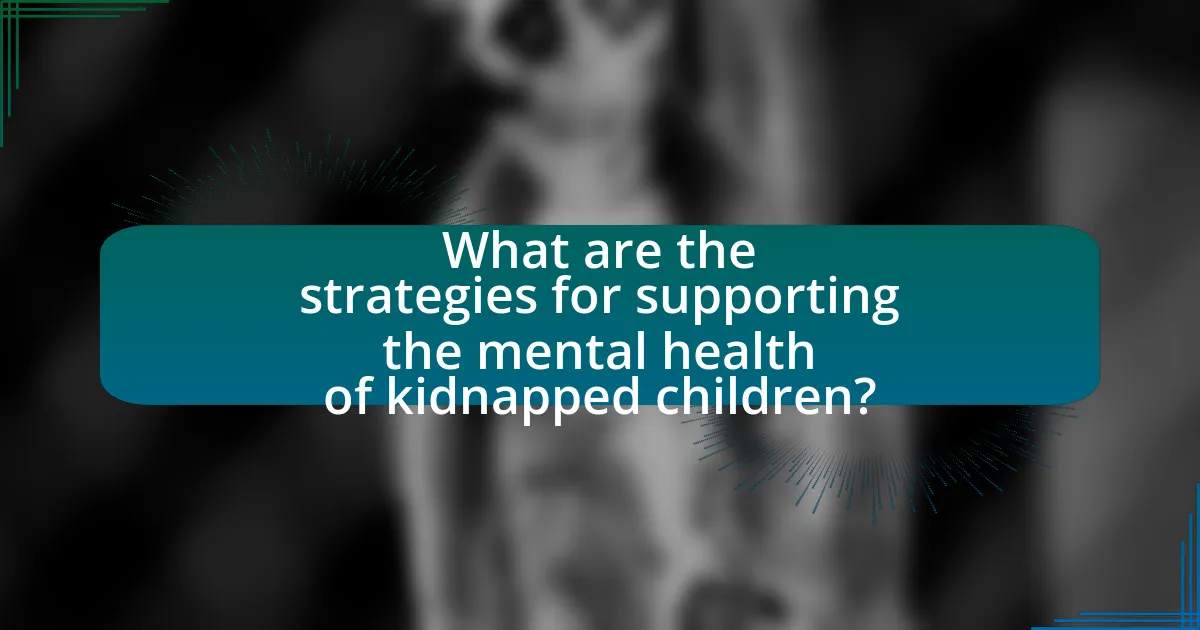The article examines the significant impact of kidnapping on children’s mental health, highlighting the prevalence of psychological issues such as post-traumatic stress disorder (PTSD), anxiety, and depression among affected children. It discusses immediate psychological effects, long-term consequences, and the factors influencing mental health outcomes, including age, family dynamics, and the nature of the kidnapping incident. The article emphasizes the importance of early intervention, trauma-informed care, and supportive environments in facilitating recovery, while also outlining the role of schools and caregivers in supporting affected children. Additionally, it identifies common mental health disorders associated with kidnapping and provides strategies for mental health professionals and families to aid in the healing process.

What is the impact of kidnapping on children’s mental health?
Kidnapping has a profoundly negative impact on children’s mental health, leading to long-term psychological issues such as post-traumatic stress disorder (PTSD), anxiety, and depression. Research indicates that children who experience kidnapping often face severe emotional distress, which can manifest as nightmares, flashbacks, and heightened fear responses. A study published in the Journal of Child Psychology and Psychiatry found that children exposed to traumatic events, including abduction, are at a significantly increased risk for developing mental health disorders, with estimates suggesting that up to 30% of these children may experience PTSD. Additionally, the disruption of their sense of safety and security can lead to difficulties in forming trusting relationships and hinder their overall emotional development.
How does kidnapping affect a child’s psychological well-being?
Kidnapping severely impacts a child’s psychological well-being by causing long-term trauma, anxiety, and depression. Research indicates that children who experience kidnapping often develop post-traumatic stress disorder (PTSD), which can manifest as nightmares, flashbacks, and severe emotional distress. A study published in the Journal of Child Psychology and Psychiatry found that 30% of children exposed to traumatic events, including kidnapping, exhibit significant psychological symptoms, highlighting the prevalence of mental health issues in this population. Additionally, the disruption of a child’s sense of safety and security can lead to difficulties in forming trusting relationships and hinder emotional development.
What are the immediate psychological effects of kidnapping on children?
The immediate psychological effects of kidnapping on children include acute stress reactions, anxiety, and symptoms of post-traumatic stress disorder (PTSD). Research indicates that children may experience intense fear, confusion, and helplessness during and immediately after the kidnapping event. A study published in the Journal of the American Academy of Child and Adolescent Psychiatry found that children exposed to traumatic events, such as kidnapping, often exhibit symptoms like nightmares, hypervigilance, and emotional numbing shortly after the incident. These psychological responses can disrupt their ability to function normally and may lead to long-term mental health issues if not addressed promptly.
How do long-term effects manifest in children who have been kidnapped?
Long-term effects in children who have been kidnapped often manifest as severe psychological issues, including post-traumatic stress disorder (PTSD), anxiety, depression, and difficulties in forming relationships. Research indicates that children who experience kidnapping may develop PTSD symptoms such as flashbacks, nightmares, and heightened emotional responses, which can persist for years after the event. A study published in the Journal of the American Academy of Child & Adolescent Psychiatry found that children exposed to traumatic events, including abduction, are at a significantly higher risk for developing long-term mental health disorders. Additionally, these children may struggle with trust issues and social withdrawal, impacting their ability to engage in healthy relationships and social interactions.
Why is understanding the impact of kidnapping on mental health important?
Understanding the impact of kidnapping on mental health is crucial because it directly influences the psychological well-being and development of affected individuals, particularly children. Research indicates that children who experience kidnapping may suffer from long-term mental health issues such as post-traumatic stress disorder (PTSD), anxiety, and depression. For instance, a study published in the Journal of Traumatic Stress found that 90% of children who were kidnapped exhibited symptoms of PTSD, highlighting the severe psychological consequences of such traumatic experiences. Recognizing these impacts allows for the development of targeted interventions and support systems to aid recovery and promote resilience in affected children.
What role does early intervention play in mitigating mental health issues?
Early intervention plays a crucial role in mitigating mental health issues by providing timely support and resources to individuals at risk. Research indicates that early intervention can significantly reduce the severity and duration of mental health disorders, particularly in children who have experienced trauma, such as kidnapping. For instance, a study published in the Journal of the American Academy of Child & Adolescent Psychiatry found that early therapeutic interventions can lead to improved emotional regulation and resilience in children exposed to traumatic events. This evidence underscores the importance of addressing mental health concerns promptly to foster better long-term outcomes.
How can awareness of these impacts influence prevention strategies?
Awareness of the impacts of kidnapping on children’s mental health can significantly enhance prevention strategies by informing targeted interventions and resource allocation. Understanding the psychological effects, such as anxiety, depression, and post-traumatic stress disorder, enables stakeholders to develop comprehensive support systems that address these specific needs. For instance, research indicates that early psychological intervention can mitigate long-term mental health issues in children who have experienced trauma (Perry, 2006). By recognizing the signs of mental distress and the potential for long-term consequences, prevention strategies can incorporate mental health education, community support programs, and training for law enforcement and educators to better respond to incidents of kidnapping. This informed approach ultimately leads to more effective prevention measures and improved outcomes for affected children.
What are the common mental health disorders associated with kidnapping?
Common mental health disorders associated with kidnapping include post-traumatic stress disorder (PTSD), anxiety disorders, depression, and adjustment disorders. Research indicates that individuals who have experienced kidnapping often exhibit symptoms of PTSD, characterized by flashbacks, severe anxiety, and uncontrollable thoughts about the traumatic event. A study published in the Journal of Traumatic Stress highlights that survivors frequently develop anxiety disorders, which manifest as excessive worry and fear. Additionally, depression is prevalent among victims, leading to feelings of hopelessness and a lack of interest in previously enjoyed activities. Adjustment disorders may also arise, as individuals struggle to cope with the changes in their lives following the traumatic experience. These disorders are supported by clinical observations and studies that document the psychological impact of kidnapping on victims.
How does post-traumatic stress disorder (PTSD) develop in kidnapped children?
Post-traumatic stress disorder (PTSD) develops in kidnapped children primarily due to exposure to traumatic events during the abduction and captivity. The intense fear, helplessness, and horror experienced during the kidnapping can lead to alterations in the child’s stress response system, resulting in symptoms such as flashbacks, nightmares, and severe anxiety. Research indicates that children who endure such traumatic experiences are at a heightened risk for PTSD, with studies showing that approximately 30% of children exposed to trauma develop this disorder. The severity and duration of the trauma, along with the child’s age and pre-existing vulnerabilities, significantly influence the likelihood of developing PTSD.
What other mental health issues are prevalent among survivors of kidnapping?
Survivors of kidnapping often experience a range of mental health issues, including post-traumatic stress disorder (PTSD), anxiety disorders, depression, and attachment disorders. Research indicates that PTSD is particularly prevalent, with studies showing that up to 50% of kidnapping survivors may develop this condition due to the traumatic nature of their experience. Additionally, anxiety disorders can manifest as generalized anxiety or panic attacks, while depression may arise from feelings of helplessness and loss of control. Attachment disorders can occur, especially in children, affecting their ability to form healthy relationships in the future. These mental health issues are supported by findings from various psychological studies that highlight the long-term impact of trauma on individuals who have experienced kidnapping.

What factors influence the mental health outcomes of kidnapped children?
The mental health outcomes of kidnapped children are influenced by several key factors, including the duration of captivity, the nature of the abduction, the child’s age and developmental stage, and the availability of post-rescue support. Research indicates that longer periods of captivity can lead to more severe psychological effects, such as PTSD, anxiety, and depression. For instance, a study published in the Journal of Traumatic Stress found that children held for extended periods exhibited higher levels of trauma-related symptoms compared to those released quickly. Additionally, the circumstances surrounding the abduction, such as violence or threats, can exacerbate mental health issues. The child’s age also plays a critical role; younger children may struggle more with understanding the situation, leading to different psychological responses. Finally, access to mental health resources and supportive environments after rescue significantly impacts recovery, as highlighted in a report by the National Center for Missing & Exploited Children, which emphasizes the importance of therapeutic interventions in aiding recovery.
How does the age of the child at the time of kidnapping affect mental health?
The age of a child at the time of kidnapping significantly affects their mental health, with younger children often experiencing more severe psychological consequences. Research indicates that children aged 0-6 are particularly vulnerable, as their cognitive and emotional development is still in its formative stages, leading to heightened risks of anxiety, depression, and post-traumatic stress disorder (PTSD). A study published in the Journal of Child Psychology and Psychiatry found that children kidnapped before the age of 10 exhibited more profound long-term emotional disturbances compared to older children, who may have better coping mechanisms. This vulnerability is attributed to younger children’s limited understanding of the situation and their reliance on caregivers for emotional support, which can be disrupted during a kidnapping.
What specific vulnerabilities do younger children face?
Younger children face specific vulnerabilities such as developmental immaturity, limited coping mechanisms, and heightened susceptibility to trauma. Developmental immaturity means they may not fully understand or process the situation, leading to confusion and fear. Limited coping mechanisms hinder their ability to manage stress and anxiety effectively. Research indicates that children exposed to traumatic events, such as kidnapping, are at a higher risk for long-term mental health issues, including PTSD, anxiety, and depression, as noted in studies by the American Psychological Association. These vulnerabilities make younger children particularly at risk for adverse psychological outcomes following traumatic experiences.
How do adolescents respond differently to kidnapping experiences?
Adolescents respond to kidnapping experiences with a range of psychological effects that differ from those of younger children and adults. Research indicates that adolescents may exhibit heightened emotional responses, such as increased anxiety, depression, and post-traumatic stress disorder (PTSD) symptoms, due to their developing cognitive abilities and social awareness. For instance, a study published in the Journal of Adolescent Health found that adolescents are more likely to internalize trauma, leading to long-term mental health issues, compared to younger children who may display more externalizing behaviors. This difference is attributed to adolescents’ greater capacity for understanding the implications of their experiences, which can intensify feelings of fear and helplessness.
What role do family dynamics play in recovery from kidnapping?
Family dynamics significantly influence recovery from kidnapping by providing emotional support, stability, and a sense of safety. A nurturing family environment can facilitate open communication, allowing the child to express feelings and fears, which is crucial for processing trauma. Research indicates that children who experience strong familial bonds and support systems tend to exhibit better psychological outcomes post-trauma. For instance, a study published in the Journal of Child Psychology and Psychiatry found that children with supportive family relationships showed lower levels of post-traumatic stress symptoms compared to those with strained family dynamics. Thus, positive family interactions can enhance resilience and promote healing in children recovering from kidnapping.
How can supportive family environments aid in healing?
Supportive family environments aid in healing by providing emotional stability, fostering resilience, and promoting open communication. These environments create a safe space where children feel valued and understood, which is crucial for their recovery from trauma, such as kidnapping. Research indicates that children who experience strong familial support are more likely to develop effective coping strategies and exhibit lower levels of anxiety and depression. For instance, a study published in the Journal of Family Psychology found that children with supportive family dynamics showed significant improvements in mental health outcomes following traumatic experiences. This highlights the essential role that family support plays in the healing process for children affected by kidnapping.
What negative impacts can family dysfunction have on recovery?
Family dysfunction can significantly hinder recovery by creating an unstable emotional environment that exacerbates mental health issues. Children from dysfunctional families may experience increased anxiety, depression, and feelings of isolation, which can impede their ability to cope with trauma. Research indicates that supportive family dynamics are crucial for recovery; for instance, a study published in the Journal of Family Psychology found that children with strong familial support systems showed better resilience and recovery outcomes after traumatic events. In contrast, those in dysfunctional settings often lack the necessary emotional support, leading to prolonged psychological distress and difficulties in forming healthy relationships, further complicating their recovery process.
How does the nature of the kidnapping incident affect mental health outcomes?
The nature of the kidnapping incident significantly influences mental health outcomes, with factors such as duration, type of captivity, and the presence of violence playing critical roles. Research indicates that prolonged captivity and exposure to violence correlate with higher rates of post-traumatic stress disorder (PTSD), anxiety, and depression among victims. For instance, a study published in the Journal of Traumatic Stress found that children who experienced violent kidnappings exhibited more severe psychological symptoms compared to those who were abducted without violence. Additionally, the context of the kidnapping, such as whether it was perpetrated by a stranger or someone known to the victim, also affects the psychological impact, with familiar perpetrators often leading to more complex trauma responses.
What differences exist between abduction by strangers and familial kidnapping?
Abduction by strangers and familial kidnapping differ primarily in the relationship between the abductor and the victim. In abduction by strangers, the perpetrator has no prior relationship with the child, often leading to a higher level of fear and trauma due to the unpredictability and anonymity of the situation. Conversely, familial kidnapping involves a family member, which can create complex emotional responses, including feelings of betrayal and confusion, as the child may have previously trusted the abductor. Research indicates that children who experience abduction by strangers often face acute stress reactions, while those involved in familial kidnapping may struggle with long-term emotional and psychological issues due to the breach of familial trust.
How does the duration of captivity influence psychological effects?
The duration of captivity significantly influences psychological effects, with longer periods often leading to more severe mental health issues. Research indicates that prolonged captivity can result in complex post-traumatic stress disorder (C-PTSD), anxiety, depression, and difficulties in social reintegration. For instance, a study published in the Journal of Traumatic Stress found that children held for extended periods exhibited higher levels of emotional dysregulation and behavioral problems compared to those with shorter captivity durations. This correlation underscores the critical impact of time spent in captivity on the psychological well-being of affected individuals.

What are the strategies for supporting the mental health of kidnapped children?
Strategies for supporting the mental health of kidnapped children include providing immediate psychological support, ensuring a safe environment, and facilitating family reunification. Immediate psychological support, such as trauma-informed therapy, helps children process their experiences and emotions. Creating a safe environment allows children to regain a sense of security, which is crucial for their recovery. Facilitating family reunification is essential, as maintaining connections with loved ones can significantly improve emotional well-being. Research indicates that children who receive timely mental health interventions after traumatic events show better long-term outcomes, highlighting the importance of these strategies.
How can mental health professionals assist in the recovery process?
Mental health professionals can assist in the recovery process by providing trauma-informed care tailored to the unique experiences of children who have been kidnapped. This approach includes conducting thorough assessments to understand the psychological impact of the kidnapping, offering evidence-based therapies such as cognitive-behavioral therapy (CBT) to address trauma symptoms, and facilitating support groups that foster peer connections and shared experiences. Research indicates that trauma-informed care significantly improves recovery outcomes, as it helps children process their experiences in a safe environment, thereby reducing symptoms of anxiety and depression.
What therapeutic approaches are most effective for kidnapped children?
Cognitive Behavioral Therapy (CBT) and Trauma-Focused Cognitive Behavioral Therapy (TF-CBT) are the most effective therapeutic approaches for kidnapped children. These methods specifically address the trauma and anxiety associated with their experiences, helping children process their feelings and develop coping strategies. Research indicates that TF-CBT significantly reduces symptoms of post-traumatic stress disorder (PTSD) in children who have experienced trauma, including kidnapping, by integrating trauma-sensitive interventions with cognitive behavioral techniques. A study published in the Journal of the American Academy of Child & Adolescent Psychiatry found that TF-CBT led to substantial improvements in emotional and behavioral functioning among traumatized youth.
How can trauma-informed care be implemented in treatment?
Trauma-informed care can be implemented in treatment by integrating an understanding of the impact of trauma on individuals into all aspects of care. This approach involves recognizing the signs of trauma, creating a safe environment, and fostering trust between caregivers and patients. Research indicates that trauma-informed care improves treatment outcomes by addressing the specific needs of trauma survivors, particularly in vulnerable populations such as children affected by kidnapping. For instance, the Substance Abuse and Mental Health Services Administration (SAMHSA) emphasizes the importance of safety, choice, collaboration, trustworthiness, and empowerment in trauma-informed practices, which can significantly enhance the therapeutic relationship and promote healing.
What role do schools play in supporting the mental health of affected children?
Schools play a crucial role in supporting the mental health of children affected by kidnapping by providing a safe environment, access to mental health resources, and fostering social connections. They implement programs that promote emotional well-being, such as counseling services and mental health education, which help children process their experiences and develop coping strategies. Research indicates that schools with comprehensive mental health programs can significantly reduce symptoms of anxiety and depression in affected children, thereby enhancing their overall resilience and academic performance. For instance, a study published in the Journal of School Psychology found that schools that integrated mental health services saw a 20% improvement in students’ emotional well-being.
How can educators be trained to recognize and respond to mental health issues?
Educators can be trained to recognize and respond to mental health issues through specialized training programs that focus on identifying symptoms, understanding mental health conditions, and implementing intervention strategies. These programs often include workshops, online courses, and collaboration with mental health professionals to equip educators with the necessary skills. Research indicates that training can significantly enhance educators’ ability to identify at-risk students and provide appropriate support, as evidenced by a study published in the Journal of School Psychology, which found that trained educators were 50% more likely to recognize signs of mental health issues compared to those without training.
What programs can schools implement to support recovery and reintegration?
Schools can implement trauma-informed care programs to support recovery and reintegration for children affected by kidnapping. These programs focus on creating a safe and supportive environment, integrating mental health services, and providing training for staff to recognize and respond to trauma-related behaviors. Research indicates that trauma-informed approaches can significantly improve emotional and behavioral outcomes for affected students, as they promote resilience and coping strategies. For instance, a study published in the Journal of School Psychology found that schools employing trauma-informed practices reported a 30% decrease in behavioral issues among students with trauma histories.
What practical steps can caregivers take to support a child’s mental health post-kidnapping?
Caregivers can support a child’s mental health post-kidnapping by providing a safe and stable environment, encouraging open communication, and seeking professional help. Establishing a routine helps the child regain a sense of normalcy, while open dialogue allows them to express feelings and fears. Professional support, such as therapy, is crucial as studies indicate that trauma-informed care significantly aids recovery in children who have experienced traumatic events, including kidnapping.
How can caregivers create a safe and supportive environment for healing?
Caregivers can create a safe and supportive environment for healing by establishing consistent routines, providing emotional support, and ensuring physical safety. Consistent routines help children feel secure and reduce anxiety, which is crucial for recovery from trauma. Emotional support involves active listening, validating feelings, and encouraging open communication, which fosters trust and helps children process their experiences. Ensuring physical safety includes creating a secure space free from threats and promoting a sense of stability. Research indicates that a nurturing environment significantly enhances resilience and recovery in children who have experienced trauma, such as kidnapping, by facilitating emotional regulation and fostering a sense of belonging.
What resources are available for families affected by kidnapping?
Families affected by kidnapping can access various resources, including support groups, counseling services, and legal assistance. Support groups, such as those offered by the National Center for Missing and Exploited Children, provide emotional support and shared experiences among families. Counseling services, including trauma-informed therapy, help families process their experiences and cope with the psychological impact of kidnapping. Legal assistance is available through organizations like the National Organization for Victim Assistance, which offers guidance on navigating the legal system and understanding victims’ rights. These resources are crucial for addressing the emotional and psychological challenges that arise from such traumatic events.

